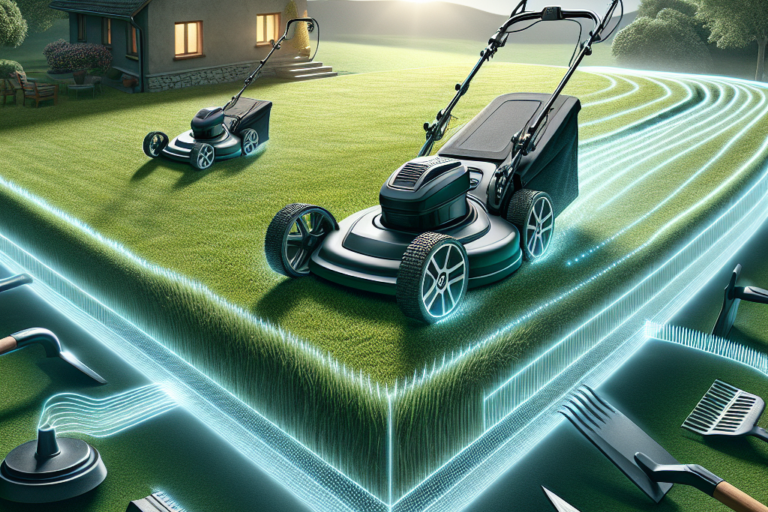If you’ve ever wondered about the environmental impact of using an electric lawn mower, you’re in the right place. In this article, we’ll explore the potential consequences on our environment when it comes to maintaining our lawns using electric-powered tools. From energy consumption to emissions, we’ll take a closer look at how these eco-friendly machines measure up and what steps we can take to minimize their impact. So, get ready to discover the environmental footprint of your trusty electric lawn mower, and find out how you can make your lawn care routine a little greener.
Air Pollution
Emissions of Electric Lawn Mowers
When it comes to air pollution, electric lawn mowers offer a significant advantage over their gas-powered counterparts. Electric mowers produce zero emissions at the point of use, meaning that they do not release harmful pollutants into the air while being operated. This is particularly important in urban areas where air quality can already be compromised. With electric mowers, you can enjoy the beauty of a well-maintained lawn without contributing to air pollution.
Comparison to Gas-Powered Lawn Mowers
Gas-powered lawn mowers, on the other hand, emit a considerable amount of pollutants into the atmosphere. These mowers burn fossil fuels, such as gasoline, which release carbon monoxide, nitrogen oxides, and volatile organic compounds (VOCs) when combusted. These emissions contribute to smog formation and can have detrimental effects on human health and the environment. By switching to an electric lawn mower, you can help reduce these harmful emissions and contribute to a cleaner and healthier environment.
Reduction of Air Pollutants
By choosing an electric lawn mower, you are actively contributing to the reduction of air pollutants. The absence of direct emissions from electric mowers not only improves air quality in your immediate surroundings but also has a positive impact on larger-scale air pollution. This reduction in air pollutants can benefit both human health and the environment by decreasing the occurrence of respiratory illnesses, minimizing the formation of smog, and slowing down climate change. Switching to electric lawn mowers is a simple yet effective way to make a significant difference in air quality.
Noise Pollution
Electric vs. Gas-Powered Lawn Mowers
In addition to their beneficial impact on air pollution, electric lawn mowers also contribute to a reduction in noise pollution. Compared to the loud and often disruptive noise produced by gas-powered mowers, electric mowers operate at a much lower decibel level. This means that your lawn care activities will be quieter and less likely to disturb your neighbors or disrupt your own peace and tranquility. Electric mowers provide the perfect solution for those seeking a quieter and more peaceful mowing experience.
Effects on Human Health
Excessive exposure to noise pollution can have detrimental effects on human health. Prolonged exposure to high levels of noise can lead to increased stress levels, difficulty in concentration, and even hearing impairment. Gas-powered lawn mowers, with their loud noise emissions, can contribute to these health issues. By opting for an electric lawn mower, you can minimize the negative impact of noise pollution on your health and the health of those around you.
Environmental Consequences
Beyond the effects on human health, noise pollution can also have significant environmental consequences. Excessive noise can disrupt wildlife habitats, leading to changes in behavior and a disruption in natural processes. Animals may be forced to alter their migration patterns, feeding habits, or mating behaviors, which can have far-reaching ecological implications. By choosing an electric lawn mower and reducing noise pollution, you are helping to protect local wildlife and preserve the balance of natural ecosystems.

Water Pollution
Runoff Contamination
Water pollution is a serious concern, and traditional lawn care practices can contribute to this problem. When using gas-powered mowers, the fuel and oil residues can leak and contaminate nearby water sources through runoff. These pollutants can have severe consequences for aquatic ecosystems and pose a threat to the quality of our drinking water. Electric lawn mowers, on the other hand, do not produce these harmful residues, thus minimizing the risk of water pollution through runoff.
Chemical Fertilizers and Pesticides
In addition to the potential for runoff contamination from mowers, the use of chemical fertilizers and pesticides in lawn care can also contribute to water pollution. These substances can leach into the soil and find their way into groundwater or enter water bodies through runoff. Electric mowers, although not directly related to the use of fertilizers and pesticides, play a part in reducing overall water pollution by encouraging eco-friendly practices. By using an electric mower in conjunction with natural or organic lawn care methods, you can further minimize the risk of water pollution and protect our precious water resources.
Impacts on Aquatic Ecosystems
Water pollution from lawn care activities can have devastating impacts on aquatic ecosystems. The presence of contaminants in water bodies can disrupt the natural balance and harm aquatic plants, fish, and other organisms. This disruption can have cascading effects throughout the food chain, leading to a decline in biodiversity and the overall health of aquatic ecosystems. Electric lawn mowers, by reducing the risk of water pollution, help to ensure the preservation of our precious natural resources and the habitats they support.
Energy Consumption
Electric Lawn Mower Efficiency
When considering energy consumption, electric lawn mowers have a notable advantage over manual or gas-powered options. Electric mowers are designed to be highly efficient, converting a larger percentage of the energy they consume into useful work. This means that less energy is wasted during operation, making electric mowers a more environmentally friendly choice. By utilizing energy efficiently, electric mowers help to minimize the overall demand for energy and reduce the strain on our energy resources.
Power Source Considerations
While electric mowers are more energy-efficient during operation, it is essential to consider the source of the electricity used to power them. If the electricity is sourced from renewable or low-carbon energy generation methods, such as solar or wind power, the environmental impact of electric mowers can be further reduced. By choosing to power your electric mower with clean energy sources, you can ensure that your lawn care activities have a minimal carbon footprint and contribute to a more sustainable energy future.
Comparison to Manual and Gas-Powered Options
In comparison to manual mowing and gas-powered mowers, electric mowers offer a more efficient and convenient solution. Manual mowing requires significant physical effort and time, while gas-powered mowers consume non-renewable fossil fuels and require regular maintenance. Electric mowers strike a balance by providing an efficient and hassle-free lawn care experience while minimizing the environmental impact. The ease of use and reduced energy consumption make electric mowers a sustainable choice for maintaining a beautiful lawn.

Greenhouse Gas Emissions
Indirect Emissions
While electric mowers themselves produce zero emissions during use, it is important to consider the indirect emissions associated with their operation. The generation of electricity used to power electric mowers may produce greenhouse gas emissions depending on the energy source. However, even when factoring in these emissions, electric mowers are still more environmentally friendly compared to their gas-powered counterparts. The significant reduction in direct emissions outweighs the indirect emissions from electricity generation, making electric mowers a greener choice overall.
Electricity Generation Sources
The environmental impact of electric mowers depends on the sources of electricity generation in your region. If your local electricity grid relies heavily on fossil fuels, such as coal or natural gas, the emissions associated with electric mowing may be higher. However, as more countries transition to renewable energy sources, the carbon footprint of electric mowers will continue to decrease. To maximize the environmental benefits of electric mowers, it is advisable to support policies and initiatives that promote the adoption of clean energy sources.
Comparison to Gas-Powered Lawn Mowers
In terms of greenhouse gas emissions, electric mowers have a clear advantage over gas-powered mowers. Gasoline combustion in traditional mowers releases carbon dioxide and other greenhouse gases directly into the atmosphere, contributing to global warming and climate change. Electric mowers, on the other hand, produce zero direct emissions at the point of use. By choosing an electric mower, you can significantly reduce your carbon footprint and contribute to efforts to mitigate climate change.
Resource Depletion
Battery Manufacturing and Disposal
Electric mowers rely on rechargeable batteries for their power source. While these batteries offer significant environmental benefits during operation, it is crucial to consider their manufacturing and disposal process. Battery manufacturing requires the extraction and processing of raw materials, some of which are non-renewable resources. However, advancements in battery technology, such as the use of lithium-ion batteries, have led to improved efficiency and reduced reliance on scarce resources. Proper disposal and recycling of batteries are also essential to minimize the environmental impact and promote resource conservation.
Material Extraction and Processing
The production of electric mowers involves the extraction and processing of various materials, including metals and plastics. While these processes have environmental implications, manufacturers are continuously striving to minimize the impact by adopting sustainable practices. By choosing electric mowers from manufacturers committed to responsible sourcing and production, you can contribute to the reduction in resource depletion and support the development of more sustainable manufacturing practices.
Sustainable Alternatives
To further address the issue of resource depletion, sustainable alternatives to traditional lawn care practices can be considered. For example, adopting manual or push reel mowers eliminates the need for batteries or electricity, reducing reliance on energy-intensive resources. Additionally, implementing natural or organic lawn care methods can reduce the demand for chemical fertilizers and pesticides, which require the extraction of raw materials. These sustainable alternatives offer an additional layer of environmental benefits and contribute to resource conservation.
Waste Generation
Battery Waste
One of the primary waste streams associated with electric mowers is battery waste. Rechargeable batteries have a limited lifespan and eventually need to be replaced. However, proper disposal and recycling of batteries can mitigate the environmental impact of battery waste. Many communities have established battery recycling programs that allow for the safe handling and recycling of used batteries. By participating in these programs and ensuring the proper disposal of batteries, you can help reduce waste generation and prevent the release of harmful substances into the environment.
Packaging Waste
Packaging waste is another aspect to consider when it comes to the environmental impact of electric mowers. Manufacturers are increasingly recognizing the importance of sustainable packaging practices and are adopting initiatives to minimize packaging waste. Choosing electric mowers from companies that prioritize eco-friendly packaging materials and utilize minimalistic packaging designs can contribute to waste reduction efforts. Remember to recycle packaging materials or choose products with recyclable packaging to further minimize the environmental impact.
End-of-Life Disposal
When an electric mower reaches the end of its life cycle, proper disposal is crucial to prevent waste from ending up in landfills. Many materials used in electric mowers, such as metals and plastics, can be recycled or repurposed. Manufacturers and retailers often offer recycling programs or guidance on how to dispose of electric mowers responsibly. By following these disposal guidelines and opting for recycling options whenever possible, you can help minimize the waste generated by electric mowers and support a more circular economy.
Land Use
Urban vs. Natural Landscapes
The choice of lawn care equipment can have an impact on land use, especially in urban settings where space is limited. Gas-powered mowers require a significant amount of space for storage and maintenance, which may not be feasible for urban dwellers. Electric mowers, with their compact and often lightweight design, are more suitable for small spaces and urban landscapes. By opting for an electric mower, you can make the most of limited land resources without compromising on the quality of your lawn care.
Green Space Preservation
Preserving green spaces is crucial for biodiversity, air quality, and overall well-being. Traditional lawn care practices, including the use of gas-powered mowers, can contribute to the loss of green spaces due to the associated environmental impacts. Electric mowers, with their reduced emissions, noise pollution, and resource consumption, enable the preservation of green spaces in urban and natural landscapes. By choosing electric mowers, you are actively contributing to the protection and preservation of precious green spaces and the benefits they provide.
Impact on Biodiversity
Landscaping choices, including the type of lawn mower used, can have a direct impact on biodiversity. Gas-powered mowers can harm insects, such as bees, through exhaust emissions and noise disturbances. These insects play a crucial role in pollination and the health of ecosystems. By switching to electric mowers, you can create a more inviting environment for beneficial insects and contribute to biodiversity conservation. The reduction in noise and emissions associated with electric mowers helps to maintain a healthier ecosystem for both plants and wildlife.
Maintenance and Upkeep
Environmental Considerations
Proper maintenance and upkeep of lawn care equipment are essential for ensuring its efficiency and longevity. When it comes to electric mowers, regular maintenance not only extends the lifespan of the equipment but also contributes to eco-friendly practices. Keeping the blades sharp and clean, cleaning the mower after use, and following the manufacturer’s maintenance guidelines can help optimize the performance of electric mowers while reducing the need for replacement parts. By practicing environmentally responsible maintenance, you can minimize waste generation and make your lawn care routine more sustainable.
Proper Handling of Chemicals
In addition to maintenance, the responsible handling of chemicals is important. Although electric mowers do not require gasoline or oil, other lawn care activities may involve the use of chemical fertilizers, pesticides, or herbicides. It is crucial to follow the recommended application rates and disposal guidelines provided by manufacturers to minimize the negative environmental impact of these chemicals. By practicing responsible chemical handling and opting for eco-friendly alternatives when possible, you can promote a healthier environment and protect the well-being of your lawn and surrounding ecosystems.
Sustainable Practices
Sustainable lawn care practices go hand in hand with the choice of equipment. In addition to using electric mowers, there are several other eco-friendly practices you can incorporate into your lawn care routine. These include conserving water by watering your lawn at appropriate times, mowing at a higher height to promote healthy root growth and reduce water consumption, and leaving grass clippings on the lawn as natural mulch. By adopting these sustainable practices, you can further minimize the environmental impact of your lawn care activities and promote a more sustainable and vibrant lawn.
Cost and Affordability
Electric Lawn Mower Price
The cost of electric lawn mowers can vary depending on the brand, features, and battery capacity. While electric mowers may have a higher upfront cost compared to gas-powered mowers, they offer long-term cost savings. Electric mowers do not require the ongoing purchase of gasoline or oil, reducing the recurring expenses associated with gas-powered mowers. Additionally, electric mowers generally have lower maintenance costs, as they have fewer moving parts that may require repair or replacement. When considering the cost of an electric mower, it is important to evaluate the long-term savings and environmental benefits it offers.
Long-Term Savings
Switching to an electric lawn mower can result in significant long-term savings. The elimination of fuel costs and reduced maintenance requirements translate into ongoing savings over the life of the mower. Additionally, electric mowers are typically more energy-efficient, which can lead to savings on electricity bills. While the initial investment may be higher, the long-term financial benefits and the positive impact on the environment make electric mowers a cost-effective choice in the long run.
Incentives and Rebates
Many governments and utility companies offer incentives and rebates to encourage the adoption of electric lawn mowers. These incentives can offset the initial cost of purchasing an electric mower and make them more affordable for consumers. Some programs may provide cash rebates, tax credits, or discounted prices for electric mowers. By researching and taking advantage of these incentives, you can further reduce the cost of an electric mower and contribute to the transition towards sustainable lawn care practices.
In conclusion, electric lawn mowers offer numerous environmental benefits compared to their gas-powered counterparts. They reduce air and noise pollution, minimize water pollution risks, lower energy consumption through increased efficiency, and contribute to greenhouse gas emission reductions. Electric mowers also help conserve resources, reduce waste generation, preserve green spaces, and promote sustainable practices. While there are upfront costs to consider, the long-term savings, incentives, and rebates make electric mowers an affordable and environmentally friendly choice for maintaining a beautiful and sustainable lawn. By making the switch to electric lawn mowers, you can actively contribute to a cleaner, healthier, and more sustainable future.






